Biography of Jankiel FENSTERSZAB
Created by a class of 9th grade students/ middle school Charles Péguy/ Palaiseau.
INTRODUCTION
Some family photos, a wedding invitation, a thimble… That is the starting point. The face of Jankiel Fensterszab is already starting to take shape in front of our impatient and curious eyes. Who was he? The memories of his daughter, Ida, have constituted the best elements to connect with Jankiel and to recount a part of his life. These family memories have been the most important material for writing the following biography. They are old and fragmented. We established an imaginary dialogue between Jankiel and Ida to make the memory work and reassemble pieces of his life. To do so, we also allowed ourselves to fill in the blanks of this “perforated” memory with some historic inserts.
1) A Childhood in Poland, in the village of Koprzywnica (1898-1920)
‘Dad, tell me the story of your childhood in Poland please.’
‘ I was born on the 15th of October 1898, in Koprzywnica, a small village betweenLublin and Krakow. It wasn’t a Shtetl, even though there were a lot of Jewish families (about a third of the population) who lived there at the time. We were one of these families. I lived there with my father, Abraham and my mother Maria, and also with my brothers and sisters. We were very happy ; we often met the other families to eat, talk and sing traditional and popular Yiddish songs on the Shabbat for instance.’
POLAND- KOPRZYWNICA
Jankiel was born in 1898 in a little village of the Russian Empire. At the time of WWI, when Koprzywnica was located on the front line between Russia and the Austro-Hungarian Empire, the town was devastated and lots of people had to leave the village and their houses. In June 1919, the small town became Polish with the Treaty of Versailles, which recognized Poland’s independence. In 1920, Koprzywnica had a population of 2300 inhabitants, which included about 800 Jews.
There was a big synagogue and a big Jewish school, a yeshiva (classes were taught in Hebrew and in Yiddish). Jankiel might have studied in this school because his mother was very religious. In the town, there was also a Jewish cemetery dating from the end of the 19th century.
‘Songs! Songs in Yiddish like « Un as der Rebbe lacht » !’
‘Yes, indeed ! I remember that we would eat tasty ravioli, chopped liver, cheese cakes, apple cakes, borscht, gefilte fish and goat cheese too… As bakers, my parents made all these traditional dishes to perfection.’
‘I do know these dishes too ! Was there a school in Koprzywnica ?’
‘Yes, I attended the town school. I was there until the age of 14. Then, I had to leave school abruptly. My father had died and we did not have enough money to pay the tuition, so I had to work at the bakery with my mother for a little while. Then, I left to be an apprentice tailor. The real advantage was that apprenticeship came with room and board. It was in 1912 and this apprenticeship lasted a few years. After the apprenticeship, I was called for military service because Russia was at war. Since Koprzywnica had become Polish in 1919, I was recruited in the Polish army where I became a corporal.’
THE ARMY
At the end of the war, in 1917-1918, Jankiel was probably 19 or 20 years old and the front line was a few kilometers away from Koprzywnica. Jankiel had probably been called by the Russian army as the village was occupied by the Russian soldiers. After 1919 (at the time of the Treaty of Versailles) many young men living in regions that had become Polish again incorporated the new Poland and had to change their Russian uniform for a Polish one. Jankiel was photographed as a corporal of the Polish Army.
‘Daddy, tell me about my grandparents.’
‘Unfortunately, I don’t really remember my father; he left us too early. As for my mother, Maria Gitla, you’ve known her a bit. She worked hard at the bakery. She was courageous and she took care of all the children. She cooked very well. She was very religious too. By the way, when she visited us in Paris around 1933, we had to hide to eat ham, do you remember that? She stayed only a short time because she didn’t like life in Paris very much. Fortunately, I have some photographs left. I also remember that my grandfather was a practicing Jew. He had a long white beard and would always dress like a rabbi. All I have from him is a picture that you have already seen.’
Portrait of Maria, my mother, dressed to face the cold winter of Poland
Portrait of my grandfather

Me, wearing the uniform of the Polish Army.
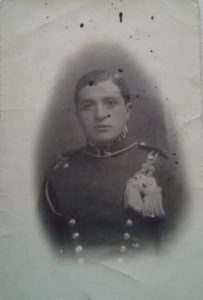
‘What made you leave your native country in the end?’
‘You have to know, Ida, that at the beginning of the 20th century, poverty and anti-Semitism was spreading in Poland, just as it was spreading in a wide part of central Europe. In 1920, that reason urged me to go into exile to Germany, in Berlin, a free city on the way to the west. It was a staging area for thousands of travelers back then.’
A SPREADING WAVE OF ANTI-SEMITISM IN POLAND IN THE YEARS 1918-1920
At the end of the 19th century, a strong nationalist movement spread throughout Europe and especially in Poland where violent anti-Semitism emerged. At the time of the Polish-Soviet War (1919-1921), the idea was that the Jews were helping the Bolsheviks in their conquest of Poland. A series of Pogroms took place in 1918-1919. This anti-Semitism among the population was accompanied by anti-Semitism within the State. Many Jewish soldiers who were serving the Polish Army were arrested and interned because they were suspected of complicity. After they had been released, many decided to leave Poland. Jankiel might have fled Poland for that reason.
2) Berlin: The Belle Epoque (1920-1923)
‘What did you do when you arrived in Berlin?’
‘First, I could do my job as a tailor! And most importantly, Berlin was the city where I met Chaja, who would later become my wife and then your mom. We had a mutual friend. At the time when we met, we would go out a lot, to the theatre, to concerts. We lived in Berlin where anti-Semitism was not as strong. There were weddings between Jewish and non-Jewish people, a thing that was unthinkable in Poland. There was also an atmosphere of freedom. We liked to walk in the big park of Tiegarten…’
‘I saw a picture of you in that park!’
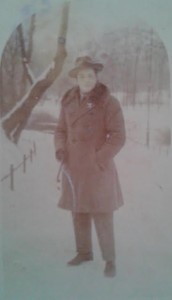
‘Yes, you have! This photograph was taken in the middle of winter. My friends and I wore our warmest coats. In Berlin, we would go to theaters such as the Kadeko -Kabarett der Komiker (Cabaret of Comedians)-or we would attend fantastic concerts of Klezmer music. Chaja was always very elegant in her Sunday dress. One day, we went to the photographer’s, and she was wearing this very dress. That is the photograph in which she had a three-quarter position, sitting on a wooden armchair.’
‘How elegant you were!’
‘What struck me in Berlin was that the atmosphere was peaceful, people were free, everybody was kissing and obviously happy. Life was pleasant and we were young and carefree. Dinners were regularly organized at our friends’ homes. There, we would laugh, talk about everything or sing Yiddish songs at the top of our lungs. We spent three wonderful years there.’
‘It is also in Berlin that Chaja and you got married, didn’t you? I still have your wedding invitation.’
‘Chaja and I got married in a religious ceremony in 1923, in Berlin, in some friends’ apartment. It did not take place at the synagogue, the rabbi came to give his blessing to us. We mainly got married to please your maternal grandmother. This sweet life didn’t last long because a terrible economic crisis made us leave Berlin. We then set off for Paris.’
THE ECONOMIC CRISIS IN GERMANY
On January 11th 1923, 60.000 French and Belgian soldiers arrived in the Rurh area, in Germany. These troops, which had been occupying the German Rhineland since the end of the Great War, extended their occupation. The value of the deutschmark depreciated rapidly as a high inflation rate together with unemployment occurred in Germany. The Weimar Republic then decided to limit immigration and took measures to exclude undocumented foreigners. This might explain Jankiel’s and Chaja’s departure for France. Jankiel had a Polish passport but he had fled Poland without being registered as a Polish national, even though it was mandatory to do it following the Treaty of Riga of 1921. Since he was born in the Russian territory, he kept his birth nationality. For both the German and French administrations, he was thus considered a “Russian refugee” but without official documents.
3) Family life in Paris (1923-1942)
VISA FROM THE PORTUGUESE CONSULATE
Jankiel entered France in November 1923 without a French visa. His passport, the only document which proved his identity, had a visa from the Portuguese Consulate and it had been made in Berlin. Chaja joined him in Paris on December 9th that same year. She had a Polish passport and a visa from the French Consulate.
‘Between 1923 and 1930, life in Paris was a very happy period, during which we met many people and went out a lot. Chaja and I used to go out quite frequently, especially on evenings. Movies, theater plays and concerts marked our lives ; however, we had already seen a good deal of plays and movies when we were in Berlin.’
‘As the movie “Grine Felder” for instance?’
‘No, Ida. I sometimes have a failing memory but I do remember the movie which made such an impression on you was not released before 1937. Your brother was born in 1924 in Paris, so after that, we did not go out as much as we did in Berlin. We would invite friends to have dinner at our place. We would throw parties every Sunday and would eat Polish dishes such as the famous bortsch that your mom cooked. We rediscovered the happy habits that we had in Berlin.’
‘I saw the picture of a Sunday Dinner, or maybe it was a Seder meal? There were about 20 people sitting at the table.’
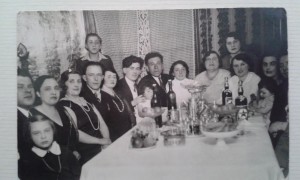
‘Yes, many people were invited. Though we knew fewer people in Paris than we did in Berlin, your mother and I adapted quickly and made new friends. However, speaking French was not that easy for me.That’s why I hired a teacher who taught your brother how to play the violin and taught me how to speak « Molière’s » style. Never did we regret our decision to come to Paris, where the economic crisis was less severe. The French capital was as attractive as a lighthouse at night. When we arrived, we only knew the name of Raymond Poincaré who was the French Prime Minister and who had initiated the Occupation of the Rurh, provoking the economic crisis in Germany.
At that time, we lived at 110 rue Montreuil, in the 11th district of Paris, not far from Place de la Nation. We liked the apartment but we had to move for several reasons. First of all, there were rats in the stairwell! It made your mom scream and each time, she had to ask the janitor to go up the stairs with her because she was so afraid of these rodents. The second and main reason for moving out was that we lacked space. The place was too small for four people.’
‘And you needed even more space since you and mom worked at home…’
‘You’re right. So, in 1936, we moved in at 22 rue Clavel in the 19th district of Paris. In the apartment, there was a big kitchen and 3 bedrooms, and the biggest of these rooms was used as a workshop. Do you remember, Ida? There was not even a bathroom. You had to go to the public shower room. Chaja and I could work late at night in that new place, without any fear of waking up the kids. Your mother was in charge of the buttonholes, and I hand-stitched the shoulder straps; I would not use the sewing machine because it made too much noise. I worked in peace… being constantly interrupted by the barkeeper of the coffee shop downstairs!
‘Monsieur Jacques, someone’s on the telephone for you!’
‘Exactly! I was “Monsieur Jacques”!’
THE EVOLUTION OF NAMES
Jankiel’s name and surname and their spelling changed according to where the family lived: Jacob Fensterschaub, Monsieur Jacques, Jankiel, Fenstersrab…
His wife, Chaja, became Hélène when they arrived to France.
‘There was always something that the customers wanted me to change on the clothes- alterations that they had forgotten to mention to me in the first place. Your mother and you had to figure out which line of the Paris metro to take to make the deliveries on time. You often had to deliver at the Louvre Museum or at Chatard’s for example. You both were a great help because I could keep on working at the workshop. Well, I still had to be careful not to disturb our neighbor, you know, the Armenian, by avoiding whistling for example.’
‘I have two loves, my country and Paris!’
‘Josephine Backer! I used to sing her songs all the time! There was also the song “Voilà les gars de la Marine” which I particularly liked. I wish I had heard these songs in concert! We used to go out a lot… You surely remember that your brother looked after you when we went out.’
‘I do! And I also remember holidays!’
‘We took holidays in Brunoy, a small village not far from Paris. How nice it was to go there for the weekend, when I was not too busy at work. I even tried to learn how to ride a bike during this leisure time. What a failure! I fell, hurt my nose badly and gave up! When we could go on vacation for a longer time, we would go to the beach in Les Sables-d’Olonne… We had a great time with my sister and your cousins. In 1937, we had our first vacation at the sea. We left Les sables-d’Olonne and got on a boat to go to an island. We took a family picture on this boat. I guess it was your uncle who took the picture since he is not in the photograph. In this photograph, I am wearing a cap and I am with your mother, your aunt, your cousins, some friends and you. Your brother is on the side, one can barely see his left arm. He didn’t like to be photographed. Actually, this was your first vacation. These moments impressed us all. The workers eventually got a paid vacation thanks to Léon Blum and the Popular Front.’
In Les Sables-d’Olonne, 1937
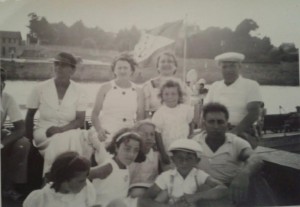
‘Serviettes everywhere !’
‘You always make the same mistake, Ida. The word is « Soviets », not « serviettes ». In 1936, I went on a few marches near Les Buttes Chaumont, I would carry you on my shoulders. These were not violent street protests, they were just big gatherings. There, we would make joyful noises and everybody would sing and laugh happily. I would carry you on my shoulders so that you could see through the crowd. At the time, political matters were the main point of discussion and it was at the heart of our lives since Chaja and I actively supported the LICA- Ligue Internationale contre l’antisémitisme (International League against Anti-Semitism)’.
‘And then… Not long afterward, in 1940, I remember that..’
‘Yes, Ida, as things got worse, we tried to keep you safe, by sending you far away, in the countryside to protect you from possible food rationing or from bombs once the Germans were in Paris. We could barely imagine what was going to happen later.
CONCLUSION:
WWII abruptly put an end to their family life, to their full life- meeting new people, cultural experiences, children’s laughter, dinners with family or friends. Ida was entrusted to a wetnurse. She seldom came back to Paris. Chaja was arrested during the 1942 Vel’d’Hiv Roundup. Jankiel and Ida’s brother, Adolphe, hid in Coubron, near Montfermeil. On July 23rd 1944, Jankiel was arrested by the military police. He was interned in Drancy and was then deported- Convoy 77- to Auschwitz. There were accounts of his presence in the camp, but nobody really knows what happened to him. His life has been erased, as many other lives. There are only some photographs, a wedding invitation and a thimble left…


 Français
Français Polski
Polski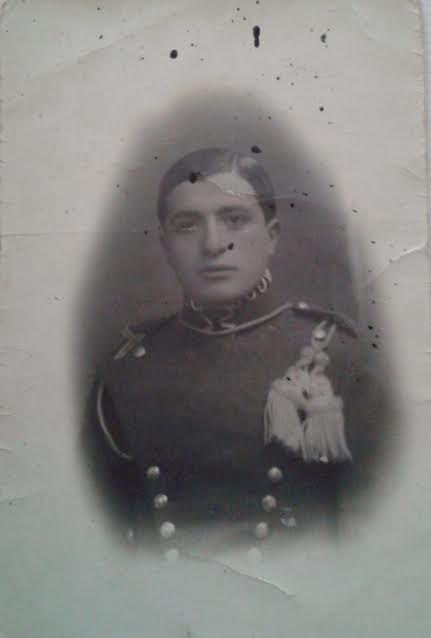











Formidable. Un grand bravo à l’équipe enseignante mais AUSSI aux élèves impliqués dans ce projet.
Merci pour cet article particulièrement intéressant. Ida Grispan, ancienne déportée d’Auschwitz, est décédée le lundi 24 septembre 2018 à l’âge de 89 ans. http://www.avis-de-deces.com/deces-celebrites/2321/Ida-Grinspan
Hello,
I live very close to Koprzywnica. I’m 42 years old. Sometimes I try to imagin how that vilage looked before II War when a lot of Jewish families lived there. There is stayed any signs after them. History of your jewish brothers and sisters is very sad and I know the word “sad” is too smoth to describe it. I try to find some information, mainly pictures, maps, where synagogue, school and other buildings were located because no one remeber it. Maybe no one want to remember…I don´t know. If you want to show me our common history just write.
P.S. I’m sory for my english.
[…] [6] Voir biographie sur le site Convoi 77 : http://www.convoi77.org/deporte_bio/fensterszab-jankiel/ […]
Merci, Claire P., je crois :-), pour cette biographie. Je suis Polonaise, je ne connais pas trop la region de Koprzywnica mais en lisant votre texte on peut s’imaginer facilement la vie d’un Juif vivant en Pologne (d’abord en Russie). Les juifs c’est notre histoire et je suis d’autant plus surprise que dans la courte presentation de Koprzywnica sur wikipedia on ne mentionne meme pas a presence des juifs dans cette region jusqu’a la II guerre mondiale…
[…] avec des œuvres littéraires, artistiques ou musicales. Les élèves ont par exemple réalisé une deuxième biographie de type dialogique pour retranscrire le témoignage de la fille d’un déporté et imaginer le dialogue […]